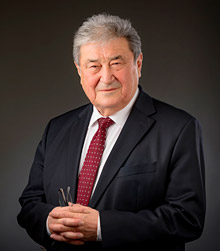
Electronic english version since 2022 |
The newspaper was founded in November 1957
| |
|
Number 21 (4618) |
New members of Russian Academy of Sciences
On 1 June 2022, the Russian Academy of Sciences welcomed two more JINR representatives as its members at the General meeting.
 Bekhzod Sadikovich Yuldashev, President of the Academy of Sciences of Uzbekistan, Plenipotentiary Representative of the Government of the Republic of Uzbekistan in JINR, Doctor of Physics and Mathematics, was elected as Foreign Member in the Nanotechnology and IT specialty of the Russian Academy of Sciences in recognition of his special merits to Russian and world science.
Bekhzod Sadikovich Yuldashev, President of the Academy of Sciences of Uzbekistan, Plenipotentiary Representative of the Government of the Republic of Uzbekistan in JINR, Doctor of Physics and Mathematics, was elected as Foreign Member in the Nanotechnology and IT specialty of the Russian Academy of Sciences in recognition of his special merits to Russian and world science.
Bekhzod Sadikovich's research interests include issues of elementary particle physics, nuclear physics, application of nuclear technologies in industry, the agricultural sector, and medicine. At the moment, the scientist takes an active part in the JINR experiments at the Large Hadron Collider at CERN. Bekhzod Yuldashev is an author of more than 400 scientific works, including 3 monographs and 20 inventions. He has trained 9 doctors and more than 30 candidates of sciences.
Bekhzod Yuldashev has been Plenipotentiary Representative of the Government of the Republic of Uzbekistan in JINR according to the decree of the Cabinet of Ministers of the Republic of Uzbekistan since 2019. In the same year, he was elected as a member of the Scientific Council of the Institute. Bekhzod Sadikovich has long-standing ties with Dubna. In 1971, Bekhzod Yuldashev defended his candidate's dissertation at the Joint Institute, in 2004, he became an Honorary Doctor of JINR.
 Alexander Vladislavovich Belushkin, Doctor of Physics and Mathematics, Head of the Sector of the Frank Laboratory of Neutron Physics JINR, was elected as RAS Corresponding Member of the Section for Nanotechnologies of the Department of Nanotechnologies and Information Technologies of the Russian Academy of Sciences.
Alexander Vladislavovich Belushkin, Doctor of Physics and Mathematics, Head of the Sector of the Frank Laboratory of Neutron Physics JINR, was elected as RAS Corresponding Member of the Section for Nanotechnologies of the Department of Nanotechnologies and Information Technologies of the Russian Academy of Sciences.
Alexander Belushkin is a prominent specialist in the fields of neutron research on condensed matter properties, an author and a co-author of 159 scientific works, 128 of them have been published in peer-reviewed scientific journals Web of Science and Scopus.
Alexander Belushkin has solved the problem of successful modernisation of the unique IBR-2 pulsed reactor. Under the leadership of Alexander Belushkin, researchers have investigated the microscopic mechanism of high proton conductivity in a new class of superproton conductors with hydrogen bonds for the first time.
Alexander Belushkin is actively engaged in teaching nuclear physics methods of condensed matter research and neutron scattering methods for studying material properties. He is Head of the Department of Nuclear Physics Materials Science of Kazan Federal University, a lecturer at the Institute of Nano-, Bio-, Information, Cognitive and Socio-humanistic Sciences and Technologies of MIPT.